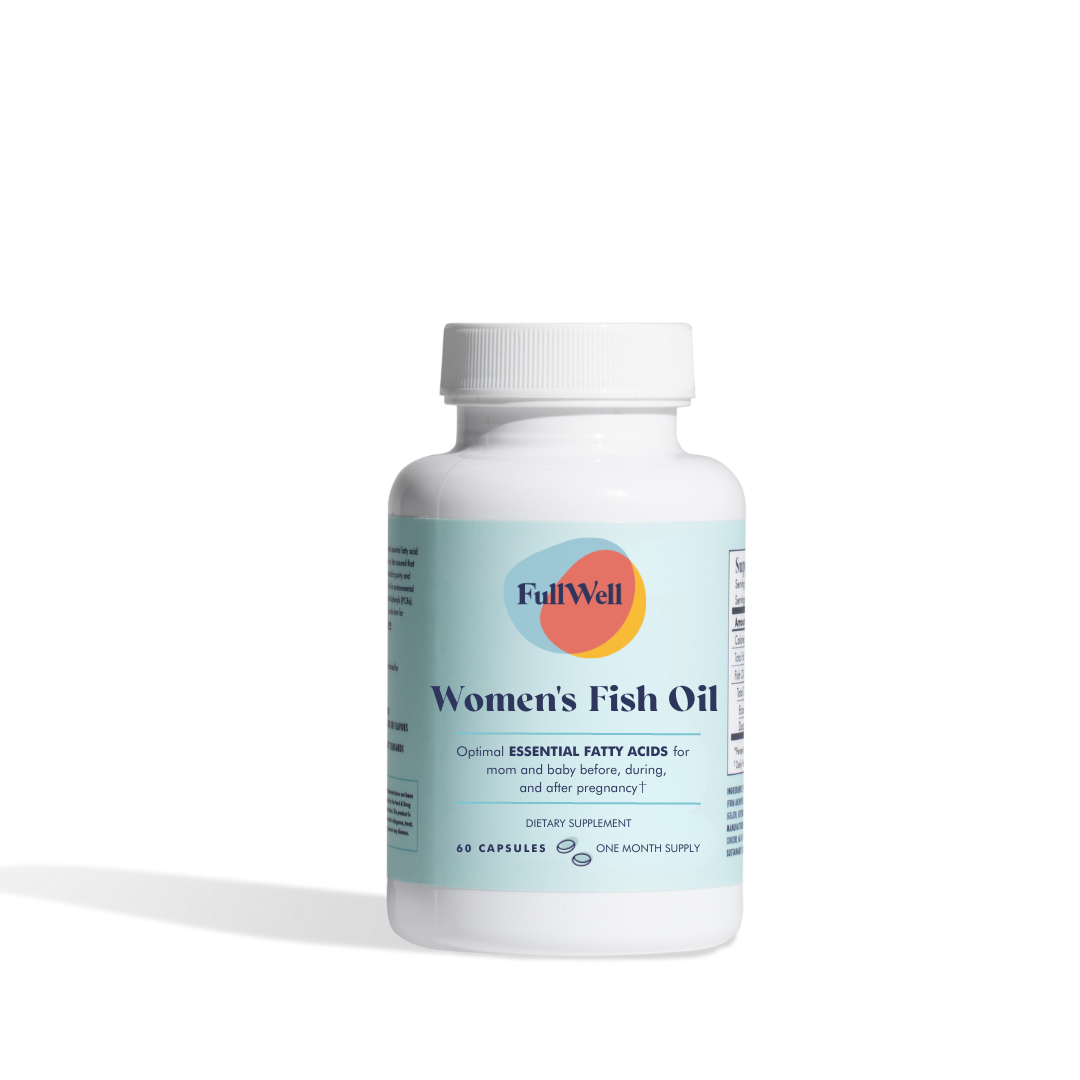Facts are Facts: The Truth About FullWell Fish Oil
Read more
Formulated to support women before, during, and after pregnancy

Omega-3s are vital for keeping our cells, nerves, and hormones healthy.* But when a woman is pregnant or breastfeeding, her needs increase, specifically docosahexaenoic acid (DHA) and eicosapentaenoic acid (EPA). Sadly, most moms-to-be don't get enough from their food alone. Luckily, fish oil with DHA and EPA, two essential types of omega-3s, can make up for this.
Our Women's Fish Oil is crafted from purified deep-sea fish oil that is sustainably caught and wild-sourced. It delivers the ideal ratio of essential fatty acids for pregnant and breastfeeding moms. Just two small, easy-to-swallow gel capsules provide the right balance of non-GMO DHA and EPA in a natural form, which ensures superior absorption and tolerance.
Picture the placenta as the baby's very first organ. Omega-3s, with a focus on DHA and EPA, play a crucial role in shaping how this special organ works during pregnancy. They help build strong blood vessels and ensure nutrients move smoothly to your growing baby. And here's the interesting part: recent studies reveal that EPA is like a helper for DHA. It helps DHA get through the placenta to the baby, boosting their development and making sure they grow well by enhancing the flow of blood in the placenta.
Omega-3s are like long-lasting helpers that stick around even after babies are born. They keep working to help the baby's brain grow, help cells talk to each other, and control how genes work.* Once baby arrives, they still need DHA for the first two years of life, which they can get from breastmilk or special baby formulas with DHA. Getting enough of these helpers can also help babies solve problems and pay attention as they get older.*
Omega-3s aren’t just for babies. They're also good for moms. Research shows that DHA can make moms feel happier by boosting feel-good hormones.* Plus, omega-3s might help moms who feel down after giving birth.* Consider it the best friend of your prenatal!
Our Women’s Fish Oil has some of the industry's lowest oxidation scores. When fish oil starts to oxidize, the levels of EPA and DHA decrease and break down into smaller compounds called free radicals. This is undesirable in terms of odor and taste, but it also means the product is less effective. Freshness is paramount when it comes to a fish oil supplement.
Heavy metal contamination is a huge problem in fish oil. We third-party test each batch to ensure our Women’s Fish Oil is free from mercury, other heavy metals, dioxins, and polychlorinated biphenyls (PCBs). We pass with flying colors and have the results to prove it!
Don’t see what you’re looking for? Our dedicated clinical team is here to help out. Reach out to us directly at hello@fullwellfertility.com.
Our manufacturing process is completely transparent and is overseen by health practitioners at every stage. Each batch is tested in-house for contaminants, allergens, and heavy metals, and we always have an independent, certified lab confirm our results.
While DHA has been extensively studied for its role in supporting brain and visual development during pregnancy and lactation, recent research indicates that EPA is crucial for facilitating DHA's transfer across the placenta, allowing the baby to effectively utilize it. Our women’s fish oil provides the optimal balance of EPA and DHA in just two, small gelcaps per day. Additionally, scientific evidence highlights the significance of a combination of both EPA and DHA, as they naturally coexist in nature, rather than isolating DHA alone.
During pregnancy, the requirement for omega-3 fatty acids is greater compared to other stages of life, as mothers serve as the primary source for the development of their babies. Scientific studies indicate that incorporating omega-3s into the diet during pregnancy can positively impact the duration of pregnancy and birth weight.
The short answer is yes! If you are still breastfeeding, your nutrient needs for omega-3 fatty acids are higher for you and baby.* Studies show that higher levels of DHA in breast milk are easily absorbed by babies and raise their DHA levels.* So optimal amounts of DHA and EPA mean that you have sufficient amounts for your health and recovery during the postpartum period, and the growing needs of baby.* At birth, the average baby's brain is about a quarter of the size of the average adult brain, so getting enough omega-3s can help support baby’s brain development during those early months and years.*
The short answer is yes! If you are still breastfeeding, your nutrient needs for omega-3 fatty acids are higher for you and your baby.* Studies show that higher levels of DHA in breast milk are easily absorbed by babies and raise their DHA levels.* So optimal amounts of DHA and EPA mean that you have sufficient amounts for your health and recovery during the postpartum period, and the growing needs of your baby.* At birth, the average baby's brain is about a quarter of the size of the average adult brain, so getting enough omega-3s can help support baby’s brain development during those early months and years.*